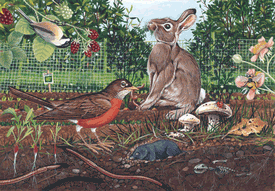
| When searching online, remember these tips: | Use some of these handy strategies: | Try these examples: |
|
Be thoughtful Be deliberate Be patient Pick, don't click |
"phrase searching" combine search terms with AND remove results using - gather search terms from your assignment description |
"contributing factors" AND pollution
causes AND pollution
effect AND pollution
solution AND pollution
introduction AND ponds
pond AND ecosystem AND interactions
pond AND ecosystem AND energy
-frog
|





The study of the ways in which organisms interact with their environment is called ecology. The word ecology was coined in 1869 by the German zoologist Ernst Haeckel, who derived it from the Greek oikos, which means “household.” Economics is derived from the same word. However, economics deals with human “housekeeping,” while ecology concerns the “housekeeping” of the natural world.
For many years, many people did not consider ecology to be an important or even a real science. By the late 20th century, however, ecology had emerged as one of the most popular and important areas of biology. The effect of the environment on the organisms that inhabit it and vice versa is now acknowledged as a key element in a wide range of issues, from population growth, climate change, environmental pollution, species extinction, and human health and medicine.
Read more HERE
Citation: "Ecology." Britannica School, Encyclopædia Britannica, 29 Jan. 2008. school.eb.com/levels/middle/article/ecology/274117. Accessed 28 Jan. 2019.